Posted February 19, 2018 by Nicky in Reviews / 0 Comments
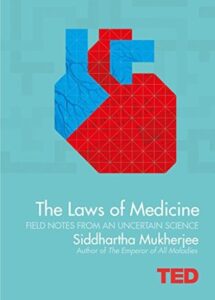 The Laws of Medicine, Siddhartha Mukherjee
The Laws of Medicine, Siddhartha Mukherjee
The description of this book weirdly states that one of the laws Mukherjee proposes is that “Rumours are more important than tests.” That’s not what he suggests: instead, he’s talking about intuition and putting two and two together so that you use the right tests in the right circumstances, reducing the number of needless false positives. He gives an example of realising that one of his patients who didn’t fit the profile was actually a drug addict, leading to being able to use a test for AIDs to figure out what was wrong with him. But doing the test for AIDs makes no sense when there are no risk factors: what really made things come together in this case was a little bit of intuition.
I’m definitely a strong believer in the power of intuition as a diagnostic tool in general. You should always check when you can, of course! But from my vague medical knowledge as a doctor’s daughter and a reader, at seventeen years old, I once realised from something about the way his face looked that someone I knew a little had a serious heart problem. I described what I saw to my mother (the doctor!) and she agreed with my intuition. But when he went to the A&E, they didn’t admit him and didn’t operate. He had an aneurysm, and yes, he died. I wish I could give that moment of intuition and insight to the doctor who saw him in A&E; I’m pretty sure my mother will agree that that intuition, that ability to connect the faintest of dots, can turn an academically good doctor into a great one.
(Yes, Mum, I know. I should be a doctor, but I’m a little old to go through medical school now and maybe my intuition will serve me well in a microbiology lab, too.)
So that rule in particular struck a chord with me, and made reading this worth it just on its own. The other two laws Mukherjee mentions are interesting and important too, but that first one was what really got my interest.
Rating: 4/5
Tags: book reviews, books, non-fiction
Posted February 18, 2018 by Nicky in Reviews / 0 Comments
 Ars Historica, Marie Brennan
Ars Historica, Marie Brennan
Not all of these stories are related to the Onyx Court stories, but enough of them are to make me really want to pick that series back up. I love the way Brennan weaves history with fantasy in these books, and especially her self-imposed rule about not allowing faeries to be the primary cause of human historical events — that way, she avoids having anything too neat and convenient, and has to find clever ways to write her faeries in. And oh, she does.
I found pretty much all of these stories satisfying, and there were none that I felt were too long or too short; Brennan really has a feel for how to write a self-contained story, even in her more sprawling worlds like the Onyx Court.
Rating: 5/5
Tags: book reviews, books, Marie Brennan, SF/F
Posted February 16, 2018 by Nicky in Reviews / 2 Comments
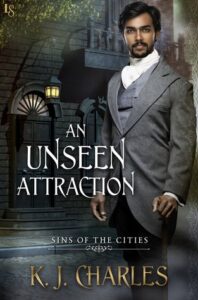 An Unseen Attraction, K.J. Charles
An Unseen Attraction, K.J. Charles
I read the last book in this series first, but it doesn’t matter too much, because they’re linked but don’t follow the exact same characters. This book features Clem and Rowley, and it’s a delight: Clem’s obvious ADHD and the way he and Rowley work with that in their relationship, and also the way that the sex scenes are not just “insert tab A into slot B”, but have feeling and thought behind them and don’t feel mechanistic at all. I’m not interested in the tab A/slot B type, but when it deepens characters’ relationships, and especially when it isn’t a mechanical write-by-numbers scene, it can still be worth reading — and such is the case here. I remember the same being true of An Unsuitable Heir.
It’s an enjoyable romance on its own, and the mystery adds a little, but I do think you might need to read all three books to really find the mystery satisfying. I need to read the middle book, and I’m honestly curious about how those two characters meet and get along, because from their appearances in this book and the third… nope!
If you’re not a fan of m/m romance at all, this won’t be for you, but if you’re looking for something in that genre which is thoughtful with rich characters, this should qualify admirably.
Rating: 4/5
Tags: book reviews, books, mystery, queer fic, romance
Posted February 15, 2018 by Nicky in Reviews / 0 Comments
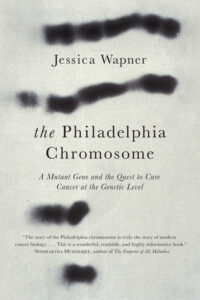 The Philadelphia Chromosome, Jessica Wapner
The Philadelphia Chromosome, Jessica Wapner
If you’ve read The Emperor of All Maladies, you already know a little about the Philadelphia chromosome, but this book goes into more depth on it and focuses exclusively on this form of cancer, bringing in some case studies and describing the scientists and physicians who were intimately involved in the research and the long road to a treatment for the cancer caused by the Philadelphia chromosomal translocation. It’s a fascinating story and well written — actually oddly gripping, if you find research like this interesting. Like a lot of the best books describing research, it made me want to get out there and do some of my own, and maybe someday be as instrumental in saving lives as some of the scientists mentioned.
I was asked with The Emperor of All Maladies if I thought the book would be a stressful read for someone who is afraid of cancer. So the same report for The Philadelphia Chromosome: I think some of the treatments and symptoms described are pretty awful, as you’d expect, but it doesn’t tend to get deeply personal or emotional about them, and the cancer caused by this particular mutation is actually extremely treatable. You might even find it a good place to jump on with learning more about cancer to demystify and undemonise it a little for that reason.
Rating: 4/5
Tags: book reviews, books, non-fiction, science
Posted February 13, 2018 by Nicky in Reviews / 4 Comments
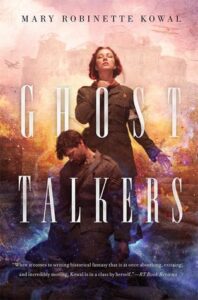 Ghost Talkers, Mary Robinette Kowal
Ghost Talkers, Mary Robinette Kowal
It took me ages to finish Ghost Talkers, and it really shouldn’t have — it’s well written and well paced, the idea is fascinating, and I wanted to know what happened… I just also came over all sulky because I (foolishly, given the setting) wanted a happier ending, and what I hoped for was quashed surprisingly early in the proceedings. Not that that surprised me, but I’d been hoping it would somehow… do something else. The book did surprise me later with one or two twists and turns, but that initial disappointment made me reluctant to get on with reading it. I imagine that should very much be filed under ‘it’s not you, it’s me’.
I enjoyed the main character, Ginger, and her relationship with her fiancé. I enjoyed the concept of mediums becoming involved in the war, and ghosts reporting in to them with their last known whereabouts, etc. It almost doesn’t need the murder mystery, though that experience does give Ginger a personal stake (as if the other circumstances weren’t enough) and gives Kowal a chance of demonstrating what the mediums in this situation would go through, experiencing the last moments of ghost after ghost. I wished there’d been more of some of the other mediums, especially Helen; her limitations in society given her ethnic origin would’ve made the story quite difficult if she was the main character, but I can’t help but wish she had been. Not that I didn’t love Ginger, but Helen would’ve been extra special.
Overall, very enjoyable; I just wish it had dodged the plot element that I immediately predicted. It’s not that it’s a bad plot or that keeping the plot very similar while constraining one of the characters in another way wouldn’t have been rather cliché, because it’s a fun story and the workaround I’m thinking of (trying not to give spoilers) would’ve been fairly predictable in itself. And certainly, that a character experiences a major loss in the context of WWII is just appropriate. But… but… I wanted different for Ginger.
Rating: 4/5
Tags: book reviews, books, Mary Robinette Kowal
Posted February 11, 2018 by Nicky in Reviews / 8 Comments
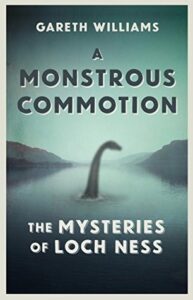 A Monstrous Commotion, Gareth Williams
A Monstrous Commotion, Gareth Williams
After reading his book on polio and his book on smallpox, I wasn’t quite sure what to make of Gareth Williams turning his hand to something like the Loch Ness Monster — but nonetheless, I knew he was a good writer and understands science and the importance of evidence. And Nessie is fascinating, of course; even if there is no Nessie (and I tend to think there isn’t) then it’s fascinating how people have believed there was a Nessie, and spent their whole lives searching for her. I needn’t have worried, anyway: Gareth Williams presents the evidence without much sign of being partial. He notes when people’s evidence was convincing or their testimony likely to be trustworthy, as well as noting when people carried out fakes.
It turns out to be exactly as fascinating as you’d expect, looking at all sorts of people who made or broke their reputations hunting for the monster. In the end, we have very little direct evidence pointing to the existence of a Nessie, so unsurprisingly the book looks at the human side of the drama, along with the sciences that, over time, people have brought to bear on the problem.
I’m sure some writers wouldn’t be able to make this interesting, but to me, Williams did. And if nothing else, he had me wanting to believe in Nessie, for all that he attempted to stay neutral himself (and I wouldn’t like to pin him down on either side of the debate for absolute certain, though I think a lot of people wish it could be true but don’t think it is).
Rating: 5/5
Tags: book reviews, books, history, non-fiction, science
Posted February 9, 2018 by Nicky in Reviews / 0 Comments
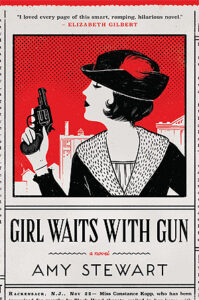 Girl Waits With Gun, Amy Stewart
Girl Waits With Gun, Amy Stewart
Girl Waits With Gun is based on the real story of Constance Kopp and her sisters, and draws inspiration from the real facts of her life — newspaper articles, family documents, etc — but it’s definitely a fictionalised version, giving Norma Kopp the hobby of looking after pigeons and so on. As a story, it’s entertaining, but perhaps more so knowing that Constance was a real person and this is one attempt to interpret her thoughts and feelings, her hopes and fears, during the time she was menaced by a mill owner who refused to pay for crashing into her family’s cart and wrecking it.
I thought it might turn out dry, but actually I got pretty into it, and on putting it down I was frustrated that a particular character didn’t know a particular fact — I won’t say what, because of spoilers. It’s enough to make me want to hurry up and pick up the next book as soon as I can. It’s obviously speculative, and it’s anybody’s guess what the Kopps would have thought about it, but it makes for a good story.
Rating: 4/5
Tags: book reviews, books, crime
Posted February 8, 2018 by Nicky in Reviews / 0 Comments
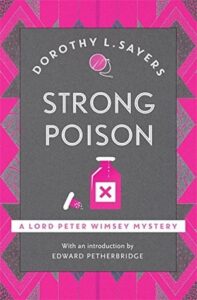 Strong Poison, Dorothy L. Sayers
Strong Poison, Dorothy L. Sayers
First of all, I love that the new edition has an introduction by Edward Petherbridge. Ian Carmichael was a brilliant voice for Peter, but if I could picture Peter, I think it’d be Petherbridge I’d see. And his introduction is fitting: erudite and respectful of Sayers’ work, but also playful.
The novel itself, well: it’s Strong Poison. I love it for so many reasons. Okay, I do get a little frustrated with Peter for making the fact that Harriet is likely to be hanged about how awful it is for him, when he barely knows her and has just fallen in love at first sight. But there’s so much witty banter, and Miss Climpson is a delight as well. And there’s the fact that this is the start of a relationship which is never fulfilled until it is equal: they start off so unequal, and Harriet’s prepared to just give in and leave things that way, but Peter steps back and waits and waits and… There could be an easy happy ending, but instead there’s a relationship that has to be worked at, until mutual respect is reached rather than pity or gratitude. No consent but free consent — how can I not applaud that story?
The mystery itself is of course tortuous, but you’d expect that from a Golden Age story like this. Peter, Miss Climpson and Bunter keep it from being weighed down — along with Parker’s delightful realisation about Mary.
Rating: 5/5
Tags: book reviews, books, crime, Dorothy L. Sayers, mystery
Posted February 6, 2018 by Nicky in Reviews / 6 Comments
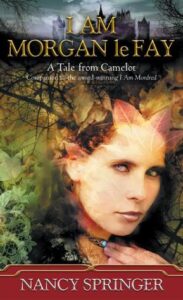 I Am Morgan Le Fay, Nancy Springer
I Am Morgan Le Fay, Nancy Springer
I Am Morgan Le Fay is a young adult novel which tries to give Morgan Le Fay more of a reason for her actions and more psychological depth. It’s reasonably successful in that, though it’s not one of my favourite Arthurian stories I’ve ever read — it seems a bit slight, and Morgan’s behaviour and the outcome was entirely obvious. The mythology is a bit of a hotchpotch, but I didn’t mind that too much because it was so lightly touched on. Cernunnos is a character, but it doesn’t really go into the significance of magic and how that’s linked to divinity in their world.
I kind of think I might be able to judge this better once I’ve read I Am Mordred as well, to see how Springer handles Mordred. Mary Stewart manages to excuse Mordred everything while throwing the blame on Morgan, and there’s always blame to go around in Arthurian stories, so I’d kind of like to see where it shifts in this case. Presumably not to Mordred, but to whom?
Rating: 3/5
Tags: Arthuriana, book reviews, books, SF/F
Posted February 5, 2018 by Nicky in Reviews / 2 Comments
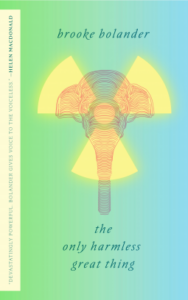 The Only Harmless Great Thing, Brooke Bollander
The Only Harmless Great Thing, Brooke Bollander
Received to review via Netgalley; publication date January 23rd 2018
I didn’t actually know much about this before picking it up: only that there was an elephant, and it somehow involved the Radium Girls. I loved the bits from the perspective of the elephants, the stories they tell: it might be a little much at length, but in little doses it was cleverly done, figuring out the way they’d think and communicate. I wasn’t in love with the modern-day plot of making the elephants glow (it seemed a little goofy to me as an idea, so I didn’t get into the character who suggested it), but the interaction between Topsy and the Radium Girl who trained her was poignant and fascinating.
Overall, it’s an interesting idea and there’s some definite gems in the writing, but I’m not sure how long it’ll stay with me. It didn’t quite come together for me, the three threads of narrative.
Rating: 3/5
Tags: book reviews, books, SF/F
 The Laws of Medicine, Siddhartha Mukherjee
The Laws of Medicine, Siddhartha Mukherjee








